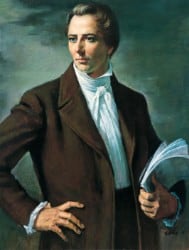
“Our Heavenly Father is more liberal in His views, and boundless in His mercies and blessings, than we are ready to believe or receive.”
| History, 1838–1856, volume D-1
Quotes By LDS Prophet Joseph Smith
Joseph Smith was the founder of The Church of Jesus Christ of Latter-day Saints. Born on December 23, 1805, in Sharon, Vermont, he is considered by members of the Church as a prophet, seer, and revelator. Joseph translated the Book of Mormon, another testament of Jesus Christ and a record of ancient American peoples as was revealed to him by God.

“Our Heavenly Father is more liberal in His views, and boundless in His mercies and blessings, than we are ready to believe or receive.”
| History, 1838–1856, volume D-1

“The fundamental principles of our religion are the testimony of the apostles and prophets, concerning Jesus Christ. That he died, was buried, and rose again at the third day, and ascended into heaven; and all other things which pertain to our religion are only appendages to it.”

“Happiness is the object and design of our existence; and will be the end thereof, if we pursue the path that leads to it; and this path is virtue, uprightness, faithfulness, holiness, and keeping all the commandments of God.”

“A religion that does not require the sacrifice of all things never has power sufficient to produce the faith necessary [to lead] unto life and salvation.”
| Lectures on Faith, p. 58.

“If children are to be brought up in the way they should go, to be good citizens here and happy hereafter, they must be taught. It is idle to suppose that children will grow up good, while surrounded with wickedness, without cultivation. It is folly to suppose that they can become learned without education.”
| Discourses of the Prophet Joseph Smith, p. 273

“If men do not comprehend the character of God, they do not comprehend themselves.”
| Teachings of the Prophet Joseph Smith, Chapter 2

“The things of God are of deep import, and time, and experience, and careful, and solemn, and ponderous thoughts can only find them out.”

“‘Will mothers have their children in eternity?’ Yes! Yes! Mothers, you shall have your children; for they shall have eternal life, for their debt is paid. There is no damnation awaiting them for they are in the spirit. But as the child dies, so shall it rise from the dead, and be forever living in the learning of God. It will never grow [in the grave]; it will still be the child, in the same precise form [when it rises] as it appeared before it died out of its mother’s arms.”
| Discourses of the Prophet Joseph Smith, ed. Alma P. Burton (Salt Lake City: Deseret Book, 1956), 138–39.

In my leisure moments I have meditated upon the subject, and asked the question, why it is that infants, innocent children, are taken away from us, especially those that seem to be the most intelligent and interesting. The strongest reasons that present themselves to my mind are these: This world is a very wicked world; and it is a proverb that the “world grows weaker and wiser;” if that is the case, the world grows more wicked and corrupt. In the earlier ages of the world a righteous man, and a man of God and of intelligence, had a better chance to do good, to be believed and received than at the present day: but in these days such a man is much opposed and persecuted by most of the inhabitants of the earth, and he has much sorrow to pass through here. The Lord takes many away, even in infancy, that they may escape the envy of man, and the sorrows and evils of this present world; they were too pure, too lovely, to live on earth; therefore, if rightly considered, instead of mourning we have reason to rejoice as they are delivered from evil, and we shall soon have them again.
| History of the Church, 4:553.

I told them I was but a man, and they must not expect me to be perfect; if they expected perfection from me, I should expect it from them; but if they would bear with my infirmities and the infirmities of the brethren, I would likewise bear with their infirmities.
| History of the Church of Jesus Christ of Latter-Day Saints, Volume 5, Page 181